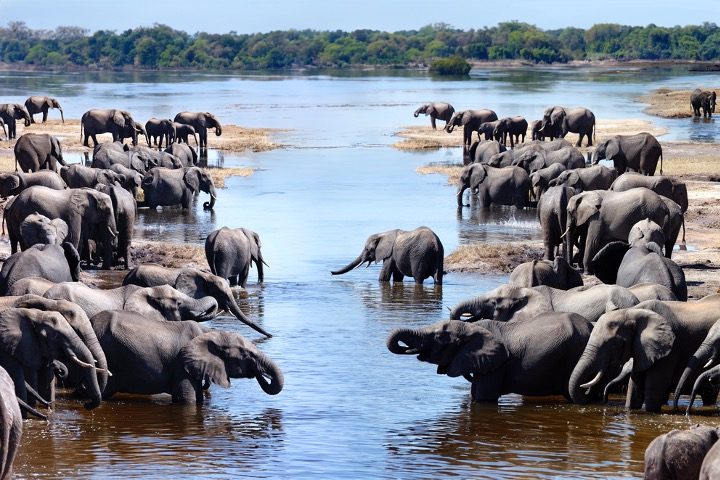
Famed general Hannibal Barca set out to invade his day’s greatest European power, Rome, with 37 elephants. Today, 2,200 years later, Botswana is making him look like a piker, floating the idea of sending 20,000 pachyderms to our time’s greatest European economic power, Germany. And though this is a war of words and not swords, it’s an interesting story that teaches an important economics/conservation lesson.
Per Remix:
Botswana has offered to send 20,000 elephants to Berlin, telling Germany’s left-wing government it should try living with the mammals before pushing trophy hunting bans on African countries.
Calls by Germany’s Federal Environment Minister Steffi Lemke for bans on trophy hunting have been met with stiff opposition in Botswana’s capital of Gaborone….
Speaking to the Bild newspaper, Botswanan President Mokgweetsi Masisi said his country was suffering from an elephant plague after recent conservation efforts, and the Botswanan people are dependent on some of the animals being culled through controlled and “sustainable” hunting.
“We are paying the price for preserving these animals for the world,” Masisi told the German tabloid, explaining it was very easy for left-wing politicians like Lemke of the Green party “to sit in Berlin and have an opinion about our affairs in Botswana.”
He explained that his government had already offloaded 8,000 of the animals to nearby Angola due to their exploding population, and threatened to send 20,000 elephants to Berlin so German politicians can “live together with the animals in the way you are trying to tell us to.”
In reality, Masisi isn’t lying about his nation’s conservation efforts. As The Indian Express reports, after conflicts in neighboring Angola and Namibia led to wide-scale poaching, elephants (smart enough to know what side their bread is buttered on) chose to stay in Botswana, whose governmental stability and sparse population made it a safe haven. The country then announced a shoot-to-kill anti-poaching policy in 2013 and a trophy-hunting ban in 2014.
The result is that while Botswana was home to fewer than 10,000 elephants in the early 1960s, the population had exploded to 80,000 by the mid-90s and now is estimated at 130,000 — despite the nation’s carrying capacity being only 60,000. The consequences?
As The Indian Express explains:
Media reports suggest that the animal has become a menace for the country’s rural communities, regularly damaging homes, drinking water from pipes, feeding on or destroying crops, and trampling people and cattle to death.
Take the example of Gobojango, a small town in Botswana. One resident told radio station Voice of America: “We are now forced to collect our livestock early as we are afraid of the elephants … In the cattle posts, people have deserted, it’s only empty homes. By 4 pm, we have rounded off the animals … so that by the time the elephants come, they do not find anyone. We wake up in the morning only to find their tracks. There are too many elephants.”
Another resident, who used to be a horticulture farmer, told VoA that “he was forced to abandon his trade because elephants constantly invaded his farm, and the compensation for loss of crops from the government was insufficient.”
A large population of elephants also threatens other species, and leads to significant biodiversity loss and habitat degradation — elephants tear down trees for fodder and consume large amounts of water, which can cause a decline in non-elephant wildlife.
Does this, however, justify trophy hunting? Westerners are generally outraged by the practice; in fact, the internet cheered when an African trophy hunter was found murdered in 2022. Yet there’s more to this story.
I’ll preface what follows by saying that though I respect honorable hunters, the only things I’ve ever hunted are inanimate objects (empty soda bottles and milk cartons everywhere shudder upon hearing my name). I’m actually the kind of guy who’ll put bugs outside when possible rather than dispatch them; I cherish life.
But I also support African trophy hunting.
There’s no contradiction here. Nuremberg Zoo director Dag Encke, asked about the German-Botswanan elephant war, weighed in on this just recently.
“Banning the import of trophies, he said, would make ‘zero contribution to species protection, but only creates one’s own moral well-being,’ adding that, ‘trophy hunting has become a highly efficient tool for international and particularly southern African species conservation,’” related Politico last Monday. “He pointed out that the practice is also endorsed by the International Union for Conservation of Nature.”
How could this be? Consider a story about one of Zimbabwe’s largest private wildlife areas, the Bubye Valley Conservancy. In 2016, Bubye announced that its more than 500 lions exceeded its carrying capacity and that, consequently, it would have to cull approximately 200 individuals. It then had two choices:
Expend resources eliminating the animals themselves.
Or let wealthy Westerners pay perhaps $50,000 to shoot one lion and possibly collect millions that could fund conservation efforts or, in the least, help fuel the Zimbabwean economy.
Which is the better choice?
Remember, too, that to Africans these animals are nuisances, killing not only livestock but thousands of people yearly. But once it’s learned that millions of dollars can be made via trophy-hunting operations, many large landowners will enter this business and open their private lands to these creatures. The result?
“Private hunting operations in these [African] countries control more than 540,000 square miles … of land,” National Geographic related in 2007 — “22 percent more land than is protected by national parks.” (This figure is surely higher today, too.)
The bottom line is that rendering a species unmarketable makes it expendable. People earning millions a year off African hunts, however, will darn well make sure extinction doesn’t end their business.
For those interested, a BBC report on the German-Botswanan “elephant war” is below.

































 Reaction & Commentary
Reaction & Commentary


















